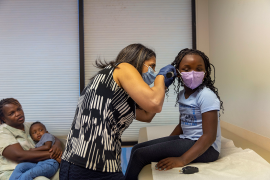The Commonwealth Fund announced today that it would give up to $100,000 a year for three years to North Carolina, Utah, Vermont, and Washington to help those states' Medicaid programs develop innovative ways to ensure healthy development for young children. The initiative, "Building State Medicaid Capacity to Provide Child Development Services" is the focal point of the Fund's Assuring Better Child Health and Development (ABCD) Program, a multi-year, multi-dimensional effort to improve the delivery and financing of child development services for young children in low-income families throughout the country. Children from poor families are more likely to lack health insurance, and less likely to have adequate access to quality health care.
The initiative includes a consortium coordinated by the National Academy for State Health Policy (NASHP) to provide ongoing and shared learning among the four states. "The consortium provides an opportunity for these states to learn from each other about what strategies are most effective and put them into action immediately," said Trish Riley, executive director of NASHP. "These programs can then serve as models to be replicated or adapted by other states."
Child Development Services Make a Difference
Enhancing pediatric care with services that take into account family environment and relationships can have a significant positive effect on a child's health and well-being. "Parents living in poverty face extraordinary barriers to getting the information and care their children need to grow up to become healthy and productive adults--whether it's lack of resources in their community, lack of information about what they can do to help their children learn and prevent injury or illness, or failure to detect early on threats to their children's healthy development," said Karen Davis, president of The Commonwealth Fund. "We're working with state Medicaid programs, which reach almost one-quarter of all U.S. children age 6 and younger, and two-thirds of poor children that age. The initiative has the potential to improve the long-term health and well-being of millions of young children through comprehensive, coordinated child health and development services for families."
A Response to Parents' Need for Help
Parents are eager for information from their children's doctors on what they can do to help their children be healthy, safe, and ready to learn. In 1995 the Fund conducted a survey of parents with young children, which revealed that the number one issue parents want help with relates to child development, and that about half the time the need is unmet. Children in families with low incomes are especially at risk. Over half (56%) of parents with incomes below $20,000 say they want more information on how to help their children learn, and 45% say they want information on toilet training and how to discipline their child.
Based on these findings, the Fund thus far has developed two initiatives that work together to evaluate and deliver enhanced child development services for greatest impact:
- Healthy Steps is testing an innovative approach to expanded pediatric care to include comprehensive child health and development information and services. Co-funded by the Fund and over 70 partners, in connection with 24 pediatric and family practices around the country, Healthy Steps is evaluating the impact of providing these services on child health and development outcomes, parent outcomes including satisfaction with pediatric care, and pediatric clinician outcomes.
- ABCD is a state-based project focused on Medicaid recipients to help improve the health and development of low-income children.
The state projects supported by the ABCD program initiative include features such as physician and parent education, uniform screening and assessment of children's development, home visits, and coordination of care between pediatricians and other health care providers to enhance standard pediatric practice and improve the quality of health care for low-income children. States are expected to obtain matching grants through federal financial participation from the Health Care Financing Administration for the administrative expenses of their projects. "By enhancing good general pediatric practice with child development services, we can do a lot to improve the health and well-being of both children and families," said Karen Scott Collins, M.D., assistant vice president at the Fund. "Programs such as home visits to new parents can improve recognition of and intervention for health problems such as maternal depression, and educating parents and providers can increase awareness of risky behaviors such as smoking. Many health problems and behaviors can have lasting negative effects on a child's health and development if they are not addressed early, and if parents are not given the information and support which can allow them to do the most for their child." The four states awarded grants from the Fund were chosen by a panel of experts in child health (including Medicaid directors from states that had not applied for funding) from among respondents to a nationwide request for proposals. Grants were awarded to projects considered the most innovative and feasible. North Carolina: A pilot program will provide uniform screening and assessment of healthy child development, physician and parent education, case managers for families, and improvements in computerized systems to help providers coordinate care. A statewide policy group will identify changes in state policy and reimbursement strategies that are needed to support and replicate the successful model. For additional information, contact: Jeffrey Simms, 919-857-4267, [email protected]. Utah: Three statewide components will include development of a standard assessment tool to identify risk factors and determine service needs, home visits by public health nurses, and resources on early childhood development for families and health care providers. For additional information, contact: Julie Olson, 801-538-6303, [email protected]. Vermont: The project will expand home visits to children up to age 5. Other new or expanded services will include parent education materials and training for pediatricians to strengthen their ability to identify children and parents who would benefit from support services. For additional information, contact: Traci Sawyers, 802-652-4176, [email protected]. Washington: A pilot program in four counties will seek to develop community agreement on a range of standardized developmental assessment tools for providers and will train providers to improve physician-parent communication, paying attention to issues of cultural competency among providers. The program will develop methods of coordinating care with specialists and linking existing services for children and families. For additional information, contact: Margaret Wilson, 360-725-1658, [email protected]. For additional information about Building State Medicaid Capacity to Provide Child Development Services, please contact Deb Curtis or Helen Pelletier at the National Academy for State Health Policy in Portland, Maine: 207-874-6524.


